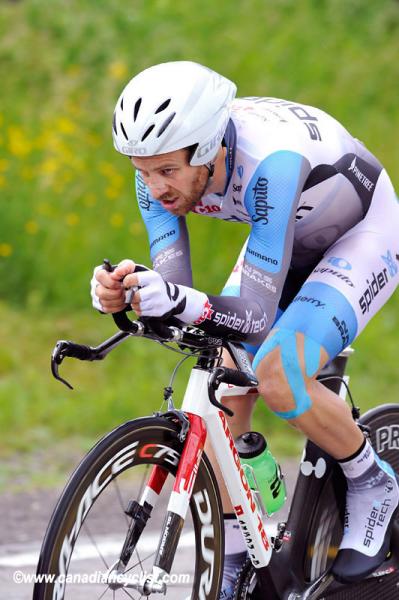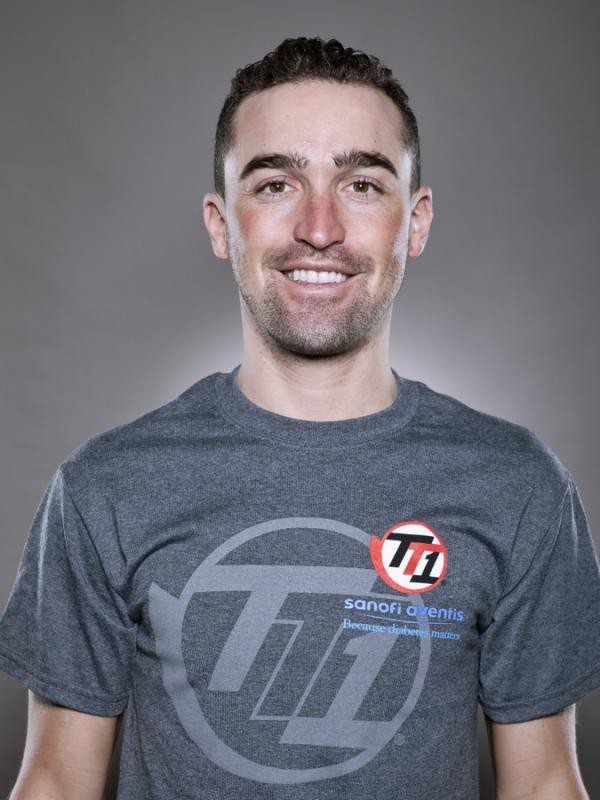Randell makes case for race radio re-think in wake of Colorado crash
"Communication vital to rider safety"


In an open letter to a number of the cycling's key stakeholders, Andrew Randell (Spidertech) has pleaded that the ban on race radios be rescinded.
Randell was caught in the crash on stage 2 of the USA Pro Cycling Challenge in Colorado, that saw Daniele Callegarin (Team Type 1), Sergio Hernandez (Jelly Belly p/b Kenda), Davide Frattini (UnitedHealthcare) and Ivan Basso (Liquigas-Cannondale) all go down after a collision with a cattle guard.
Callegarin, Randell and Hernandez were transported to the local hospital in Gunnison for treatment at the time, with Callegarin the worst affected.
Callegarin's list of injuries included a severe concussion, significant facial injuries, broken left and right hands and deep lacerations to his face, lips and chin. Randell fractured his back, while Hernandez fractured his left collarbone.
As the race was 2.1 category, no race radios were in use. Randell believes that radios could have at the very least "drastically reduced the likelihood of the incident" and in the letter argues, that radios are the most effecient form of communication in racing conditions in which things can change rapidly.
"Had we racers had enough forewarning to prepare ourselves, and space out for the cattle guard, this accident could have been avoided," said Randell.
"Commissaires and race officials ahead of the race may have realised the dangerous nature of the cattle guard, but how were they to warn us? At race speed the sudden warning shout of “cattle guard” at the head of the peloton came too close to the obstacle to change our safety, but use of race radios could have prevented, or at least drastically reduced, the likelihood of this incident."
Get The Leadout Newsletter
The latest race content, interviews, features, reviews and expert buying guides, direct to your inbox!
"Other means of warning, such as marking the cattle guard with caution notices, may not be seen by riders in the heat of the race, and foreign riders might anyway not read English signage. In addition, as was the case at the USA Pro Cycling Challenge (a well-organised and successful event) race organisers are not perfect, they can make mistakes.
"Races happen on public roads where conditions change all the time: there have been situations involving sabotage, vehicles on course, protests, changing road conditions (in the Tour of Utah a tree fell across the road in the time it took two groups to pass through the same point on a descent). The race radio is without doubt the most efficient means by which to warn riders of approaching obstacles and dangers, and the only means by which to communicate with riders in real time."
Randell was also bewildered by the UCI's argument that race radios increase the excitement of racing.
"The faulty and unfounded argument by the UCI regarding race radios is endangering the well-being, and perhaps even the lives, of riders around the world. Cycling is a professional sport conducted under varying road conditions.
"Communication is vital to the safety of the riders, and we professional riders must forthwith and unanimously demand that the UCI reverse its position on the use of race radios at all levels of racing. Cyclists are the heart of cycling and we must assert our influence on the sport to ensure our well-being."
A number of US team manager's panned the radio restriction back in March, and the issue had been a deal breaker for many WorldTour teams ahead of the recent Tour of Beijing. The UCI recently backed down on the implementation of an outright ban on radios at the WorldTour level for next season, but has shown no signs of backing down in lower category races.